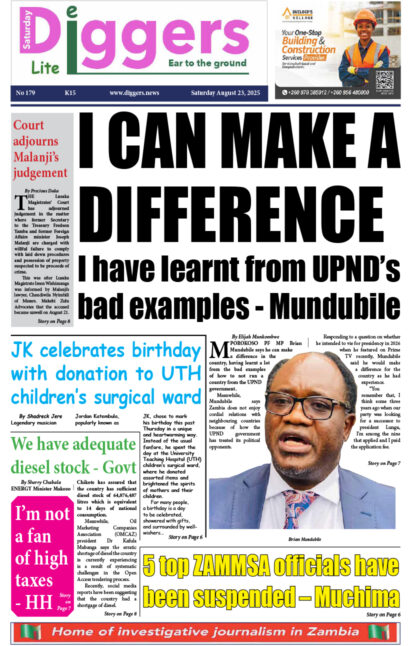UPND deputy secretary general Gertrude Imenda says it’s not only youths who have contributed to the party, adding that even those considered to be old should be included in governance because institutional memory and experience are needed.
And Imenda says UPND did not give timelines when making promises, adding that results for decisions being made now will be seen later.
Speaking when she featured on Hot FM, Tuesday, Imenda said government would not discriminate against anyone on account of age.
“I do not know what you would call young people. For example, I would like to believe that even in Cabinet there are young people. There are young DCs and Permanent Secretaries. With the latest appointments, the President has just started. I think just about five have been appointed and among those one or two are old people. It is not only the youths who have contributed to the party throughout. In fact, the same members even among the youths are saying ‘why have we ignored those who soldiered with the party from the beginning?’ We seem to have put them ‘ku wire’,” she said.
“When others started, they were young but 23 years down the line, age has caught up with them. Should we ignore them? We appreciate the youths and their role in the past few years but they were not alone. They had backup. Why should we ignore others who contributed to the party while the youths say ‘only us?’ That is not fair. Governance is about a blend because institutional memory is needed. We need experience. Let us blend with both the young and old. We should not discriminate against anybody on account of age. Jobs are coming but let us learn to share even with the people considered to be old.”
And Imenda urged investigative wings to do their work and put the matter involving Foreign Affairs Minister Stanley Kakubo to rest, arguing that it was unfair that he was being prosecuted by the press.
“The ongoing case about the FTJ University, surely if those who are responsible and they are brought for questioning, is it targeting? Nothing stops the investigative wings from going ahead to investigate. Let investigative wings find out the truth. He (Stanley Kakubo) is being prosecuted by the press which is very unfair. So let the investigative wings do their thing and put the matter to rest. If they find out [that] he committed an act of corruption then they will do something. So now if the investigative wings are following up the wrongs and malpractices that were taking place and highlighted in the Financial Intelligence Report or the Auditor General’s report, what is wrong with that? Let them tell us who else should we target? They are saying that we are targeting them, we are not targeting anybody,” she said.
“They are just following up where they see things. They were in power so are they saying we should go and look for somebody in Chama or Chief Kambombo or Shang’ombo just for the sake of doing it? If somebody is suspected to commit a crime, let them be followed up. In any case, they have not said those are guilty, they will prove themselves and if they are innocent they will be released. Right now it is just investigations. So are we saying that the Anti-Corruption Commission should just sit in offices, drink tea, smoke cigarettes and then say hello to each other and knock off at 17:00 hours? They should not do their job? So if they are to work, what do you expect them to do? They have to follow up issues and investigate. Just like the police, they have to investigate certain crimes. So even ACC, if they suspect that this person needs to give us information, what is wrong with what? It is their job. We are not targeting anybody and I would like to believe they are not targeting anybody.”
Imenda said the UPND did not attach any timelines to their promises during campaigns.
“When making promises we did not make timelines. We said when we come into power this is what is going to happen. Decisions are being made now and you will see the results later. The de-investments that happened in the past are what you are seeing now. The decisions we are making now, you will see the results later,” she said.
Imenda said the Public Order Act could be taken to Parliament to be repealed if those with legal knowledge felt it had obnoxious clauses.
“When we were in opposition, you will recall that we advocated for repealing [of] the Public Order Act because it was being used unfairly. There were a number of issues that were supposed to be tackled in that dialogue including constitutional and legal reforms. Among the legal reforms was the Public Order Act. We have let legal minds look at obnoxious clauses that do not work in tandem with the constitutional right of assembly and expression,” said Imenda.
“If the government is already working on it, it was our promise that when we come into power we will look at it. Even in the way it was, it was just that it was being abused by the powers that be at that time. All you needed to do to have an assembly was to inform the police so that they protect you. No, I am not a lawyer. I do not know those obnoxious clauses. Those who know more about it and have legal minds, if they feel it has obnoxious clauses we can only do better to take it to Parliament to be repealed.”
























